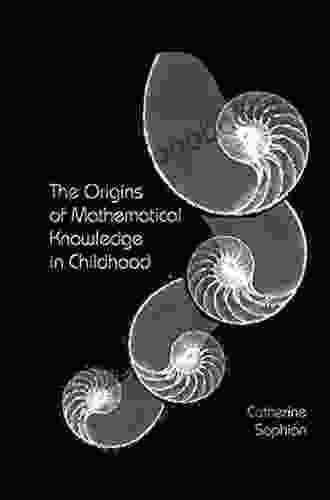The Origins of Mathematical Knowledge in Childhood: A Journey into the Roots of Mathematical Understanding

: Unraveling the Enigmatic Nature of Mathematical Cognition
Mathematics, with its intricate patterns, abstract concepts, and transformative power, has captivated the minds of thinkers for millennia. Yet, the origins of our mathematical knowledge remain shrouded in mystery. The question of how we come to grasp mathematical ideas has intrigued educators, psychologists, and philosophers alike, sparking a concerted effort to unravel this enigma.
In an attempt to shed light on this captivating subject, renowned psychologist Jean Piaget embarked on a groundbreaking study, meticulously observing the development of mathematical understanding in children. His seminal work, "The Origins of Mathematical Knowledge in Childhood," offers a profound exploration into the cognitive processes that underpin our comprehension of numbers, space, measurement, and more.
5 out of 5
| Language | : | English |
| File size | : | 1050 KB |
| Text-to-Speech | : | Enabled |
| Screen Reader | : | Supported |
| Enhanced typesetting | : | Enabled |
| Word Wise | : | Enabled |
| Print length | : | 218 pages |
Piaget's Pioneering Investigations: Unveiling the Stages of Mathematical Development
Piaget's extensive research revealed that mathematical knowledge is not simply acquired through passive learning. Instead, it is actively constructed by children as they interact with and make sense of their surroundings. Piaget proposed a series of stages that characterize the gradual development of mathematical understanding:
- Sensorimotor Stage (Birth to 2 Years): In this early stage, infants learn about the world through their senses and motor actions. They develop an understanding of basic quantities, such as "more" and "less," and begin to manipulate objects to explore spatial relationships.
- Preoperational Stage (2 to 7 Years): During this stage, children begin to use language and symbols to represent mathematical concepts. They develop a rudimentary understanding of numbers and counting, but their thinking is often egocentric and intuitive.
- Concrete Operational Stage (7 to 11 Years): Children in this stage develop a more logical and systematic approach to mathematical reasoning. They can understand the concept of conservation (i.e., the invariance of quantity despite changes in appearance) and use concrete materials to solve problems.
- Formal Operational Stage (11 Years and Up): In the final stage, children develop the ability to think abstractly and hypothetically. They can use variables and symbols to represent mathematical concepts and reason deductively to solve problems.
Key Insights from Piaget's Research: Implications for Education
Piaget's groundbreaking work has profoundly influenced our understanding of mathematical learning. His research provides valuable insights into the cognitive processes that underpin mathematical development and offers practical implications for educational practices:
- Importance of Active Learning: Piaget's findings emphasize the crucial role of active exploration and hands-on experiences in fostering mathematical understanding. Educators should create environments where children can engage with mathematical concepts through play, experimentation, and problem-solving activities.
- Sequential Nature of Learning: Piaget's stages of development highlight the sequential nature of mathematical learning. Each stage builds upon the previous one, and children need to master the concepts of each stage before moving on to the next.
- Individual Differences: Piaget's research also acknowledges that children progress through these stages at different paces. Educators need to be mindful of individual differences and provide support and scaffolding tailored to each child's developmental level.
- Importance of Play: Play is a powerful vehicle for mathematical learning, especially in the early stages. Through play, children can explore mathematical concepts, develop problem-solving skills, and foster their creativity and curiosity.
Beyond Piaget: Contemporary Perspectives on Mathematical Development
While Piaget's work laid the foundation for our understanding of mathematical cognition, contemporary research has expanded upon his theories and provided new insights into the complex nature of mathematical learning.
One significant development is the recognition of the role of embodied cognition, which emphasizes the interplay between our physical experiences and our mathematical understanding. Research has shown that children learn about spatial relationships and measurement through their interactions with the world around them.
Another important area of research focuses on the social and cultural aspects of mathematical learning. Studies have revealed that children's mathematical development is influenced by their interactions with parents, peers, and the broader community. Cultural factors, such as language, beliefs, and practices, also play a significant role in shaping children's mathematical understanding.
: Embracing the Ongoing Pursuit of Mathematical Knowledge
"The Origins of Mathematical Knowledge in Childhood" stands as a testament to the profound legacy of Jean Piaget and the enduring quest to unravel the mysteries of mathematical cognition. His pioneering work has shaped our understanding of how children learn mathematics and continues to inspire educators and researchers alike.
As we delve deeper into the intricate tapestry of mathematical development, we uncover new insights and appreciate the complex interplay of cognitive, social, and cultural factors that contribute to our mathematical understanding. The pursuit of mathematical knowledge is an ongoing journey, and "The Origins of Mathematical Knowledge in Childhood" remains an invaluable guide as we navigate this fascinating landscape.
With its comprehensive exploration of the developmental journey of mathematical understanding, "The Origins of Mathematical Knowledge in Childhood" offers a profound resource for educators, psychologists, and anyone seeking to comprehend the enigmatic nature of mathematical cognition. By embracing Piaget's pioneering investigations and engaging with contemporary perspectives, we continue to unravel the secrets of mathematical learning and foster a lifelong love of mathematics in generations to come.
5 out of 5
| Language | : | English |
| File size | : | 1050 KB |
| Text-to-Speech | : | Enabled |
| Screen Reader | : | Supported |
| Enhanced typesetting | : | Enabled |
| Word Wise | : | Enabled |
| Print length | : | 218 pages |
Do you want to contribute by writing guest posts on this blog?
Please contact us and send us a resume of previous articles that you have written.
 Book
Book Novel
Novel Page
Page Chapter
Chapter Text
Text Story
Story Genre
Genre Reader
Reader Library
Library Paperback
Paperback E-book
E-book Magazine
Magazine Newspaper
Newspaper Paragraph
Paragraph Sentence
Sentence Bookmark
Bookmark Shelf
Shelf Glossary
Glossary Bibliography
Bibliography Foreword
Foreword Preface
Preface Synopsis
Synopsis Annotation
Annotation Footnote
Footnote Manuscript
Manuscript Scroll
Scroll Codex
Codex Tome
Tome Bestseller
Bestseller Classics
Classics Library card
Library card Narrative
Narrative Biography
Biography Autobiography
Autobiography Memoir
Memoir Reference
Reference Encyclopedia
Encyclopedia Lavanya Sharma
Lavanya Sharma Ruth Glasser
Ruth Glasser Catherine Taylor
Catherine Taylor Suzanna Lynn
Suzanna Lynn David P Leong
David P Leong Allison Adelle Hedge Coke
Allison Adelle Hedge Coke Rob Ansell
Rob Ansell Rick Reilly
Rick Reilly Reinhard Bendix
Reinhard Bendix Jennifer L Armentrout
Jennifer L Armentrout Allie Burton
Allie Burton Sarah Retter
Sarah Retter Alix Lee
Alix Lee Alice Warrender
Alice Warrender Amy Epstein Feldman
Amy Epstein Feldman John Stainer
John Stainer Annie Darling
Annie Darling Allison Paolini
Allison Paolini Christian Pascale
Christian Pascale Erica Marat
Erica Marat
Light bulbAdvertise smarter! Our strategic ad space ensures maximum exposure. Reserve your spot today!
 Jason HayesFollow ·11.8k
Jason HayesFollow ·11.8k Gabriel Garcia MarquezFollow ·9.3k
Gabriel Garcia MarquezFollow ·9.3k Anton FosterFollow ·16.2k
Anton FosterFollow ·16.2k Brennan BlairFollow ·7.4k
Brennan BlairFollow ·7.4k Caleb LongFollow ·5.7k
Caleb LongFollow ·5.7k Emanuel BellFollow ·19.1k
Emanuel BellFollow ·19.1k Clarence MitchellFollow ·11.5k
Clarence MitchellFollow ·11.5k Darius CoxFollow ·17.3k
Darius CoxFollow ·17.3k

 F. Scott Fitzgerald
F. Scott FitzgeraldUnravel the Enigmatic Murder of Mary Russell: A...
Prologue: A Grisly Discovery In the...

 Connor Mitchell
Connor MitchellLittle Quilts: Gifts from Jelly Roll Scraps
Embrace the Art...

 Harold Powell
Harold PowellPoverty Survival Hope In An American City: A Pulitzer...
A testament to the resilience of the human...

 Ray Blair
Ray BlairConfronting Global Warming: Population, Resources, and...
Global warming is one of the most pressing...

 Gary Cox
Gary CoxStyle Your Most Authentic Self and Cultivate a Mindful...
Unlock Your True...

 Caleb Long
Caleb LongEmbark on a Colorful Patchwork Adventure: Discover 20 To...
Step into the captivating world of...
5 out of 5
| Language | : | English |
| File size | : | 1050 KB |
| Text-to-Speech | : | Enabled |
| Screen Reader | : | Supported |
| Enhanced typesetting | : | Enabled |
| Word Wise | : | Enabled |
| Print length | : | 218 pages |












